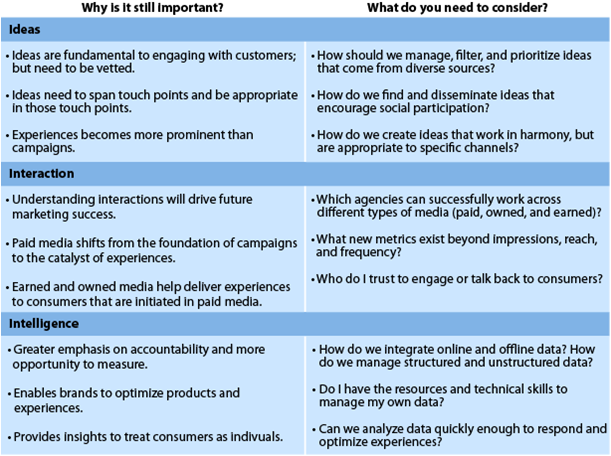Marketers Must Lead Agency Change
Today we released the report "The Future Of Agency Relationships" covered in AdAge today, in which we set out on a journey to answer the question: what is the role of agencies in the new marketing landscape? After over 50 in-depth interviews with marketing leaders, interactive marketers, procurement teams, agency leaders and industry organizations, one conclusion has become very evident – marketers must lead agency change. Virtually everyone we interviewed recognized that marketing is experiencing drastic changes, with interactive and digital technologies beginning to replace mass media as the foundation of marketing. At Forrester we call this the "Adaptive Marketing era" and it requires marketers to take a more flexible and always on approach to marketing due to the two-way communication that is now visible between consumers and companies. While most agencies are taking at least some steps to reinvent themselves, they can only go as far as their clients allow. And while many marketers are demanding agency change one moment, they’re still asking where their 30 second spot is the next. Marketers won’t see real change in the agency landscape until they begin to apply a new set of criteria to their agency partners.
We do recognize that agencies are not perfect by any stretch. Most are still modeled for the old mass media eras and, while they have been very successful at adapting to client changes over the past century and a half, most have yet to adapt to the rapid change of this new century. Most of the traditional ad agencies were slow to adopt interactive technologies and in most cases PR agencies were even slower to do so. On the other hand, interactive agencies have developed a Jan Brady “middle child” complex with their desire to “lead’ but have yet to convince most marketing leaders that they are prepared to do so. And just about every type of agency lacks the ability to leverage analytics to manage the complex amount of data marketers can now collect. Agencies see the writing on the wall, from cuts and a decreasing in faith in mass media to increased investments in interactive marketing to a dog fight over which agencies should lead social media strategies – creating a situation in which they’ve entered a "great race" competing more directly than ever while trying to learn each others’ businesses.
So what should a marketing leader do to build the right agency portfolio in this complicated landscape? While you certainly can’t just flip a switch and expect all of your agencies to fall into place, there are steps you can take. First we believe marketers need to step back and rethink what they should be outsourcing to their agencies. Forrester identified three fundamental services that agencies provide: Ideas, Interaction and Intelligence (agencies can provide other needs like infrastructure and man power, but we believe those are means to these three ends). By no means are these three I’s new, but their role in the adaptive marketing landscape is changing. We recommend that marketers simply start by applying new criteria to their current agencies to determine if they’re ready to help them into the future.

What do we see happening in result of these changes? Here are a few predictions:
- The interactive AOR becomes obsolete. Interactive technologies are becoming the foundation of marketing – a horizontal across different types of marketing rather than a vertical that stands on its own. As that happens, the need for a lead interactive agency will become unnecessary driving interactive agencies to make the choice to compete directly with traditional agencies or fall back into a specialist role (which isn’t necessarily a bad thing).
- Media (Interaction) agencies compete more directly. In the adaptive marketing era media must be managed holistically – an always on approach that balances earned, owned and paid media together. This means agencies that deal in media – like PR, interactive and media planning/buying agencies – will compete more directly than ever.
- The “Connected Agency” arises. In a world in which brands can directly tap the masses for almost any kind of agency service (like crowd sourcing creative), agencies will play a new role in directing, managing and filtering co-created content for their clients to become what we call the Connected Agency.
- A new lexicon appears. In the adaptive era language like GRP’s, impressions and clicks (i.e. potential exposure of messages and mostly accidental interactions) will be less important than lifetime value, sentiment/favorability and influence. In fact, the term “audience” is already outdated since it defines a passive group of people rather than a more relevant term like "participants."
You can see more predictions in the report. In the meantime, Forrester will continue to follow up on this research and we fully expect the conversation around the future of agencies to continue to rage on. In fact, we’re looking forward to hearing your thoughts.